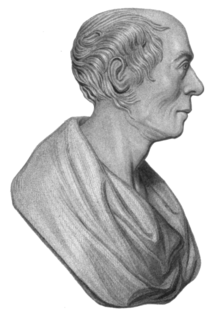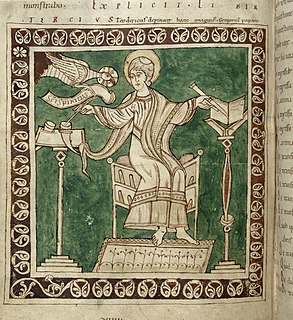A Quote by Saint Augustine
In matters that are so obscure and far beyond our vision, we find in Holy Scripture passages which can be interpreted in very different ways without prejudice to the faith we have received. In such cases, we should not rush in headlong and so firmly take our stand on one side that, if further progress in the search for truth justly undermines this position, we too fall with it.
Related Quotes
...it is not the obscure passages in Scripture that bind you but the ones you understand. With these you are to comply at once. If you understood only one passage in all of Scripture, well, then you must do that first of all. It will be this passage God asks you about. Do not first sit down and ponder the obscure passages. God's Word is given in order that you shall act according to it, not that you gain expertise in interpreting it.
When we have entered into divine covenants, the Holy Ghost is our comforter, our guide, and our companion. The fruits of the Holy Spirit are "the peaceable things of immortal glory; the truth of all things; that which quickeneth all things, which maketh alive all things; that which knoweth all things, and hath all power according to wisdom, mercy, truth, justice, and judgment" (Moses 6:61). The gifts of the Holy Spirit are testimony, faith, knowledge, wisdom, revelations, miracles, healing, and charity, to name but a few.
Why should we be willing to go by faith? We do all things in this world by faith in the word of others. By faith only we know our position in the world, our circumstances, our rights and privileges, our fortunes, our parents, our brothers and sisters, our age, our mortality. Why should Religion be an exception?
That morning I experienced vividly, if almost subliminally, the reality of change itself: how it fools our sentinels and undermines our defenses, how careful we are to look for it in the wrong places, how it does not reveal itself until it is beyond redress, how vainly we search for it around us and find too late that is has occurred within us.
We should fix ourselves firmly in the presence of God by conversing all the time with Him...we should feed our soul with a lofty conception of God and from that derive great joy in being his. We should put life in our faith. We should give ourselves utterly to God in pure abandonment, in temporal and spiritual matters alike, and find contentment in the doing of His will,whether he takes us through sufferings or consolations.
Faith is indeed the energy of our whole universe directed to the highest form of being. Faith gives stability to our view of the universe. By faith we are convinced that our impressions of things without are not dreams or delusions, but, for us, true representations of our environment. By faith we are convinced that the signs of permanence, order, progress, which we observe in nature are true. By faith we are convinced that fellowship is possible with our fellow man and with God.
For it is not the bare Words, but the Scope of the writer that giveth true light, by which any writing is to bee interpreted; and they that insist upon single Texts, without considering the main Designe, can derive no thing from them clearly; but rather by casting atomes of Scripture, as dust before mens eyes, make everything more obscure than it is; an ordinary artifice of those who seek not the truth, but their own advantage.
Leonardo da Vinci did not take received wisdom - whether from ancient classical thinkers or medieval scholars or from the Bible - without questioning it. And this was the beginning of the scientific method. This is another lesson for our time: that when we have evidence that contradicts a certain belief, we should be willing to change it. I think this made Leonardo, in some ways, a person who better understood the beauty of God's creation than a person who just takes all received wisdom from the Bible on faith.










































